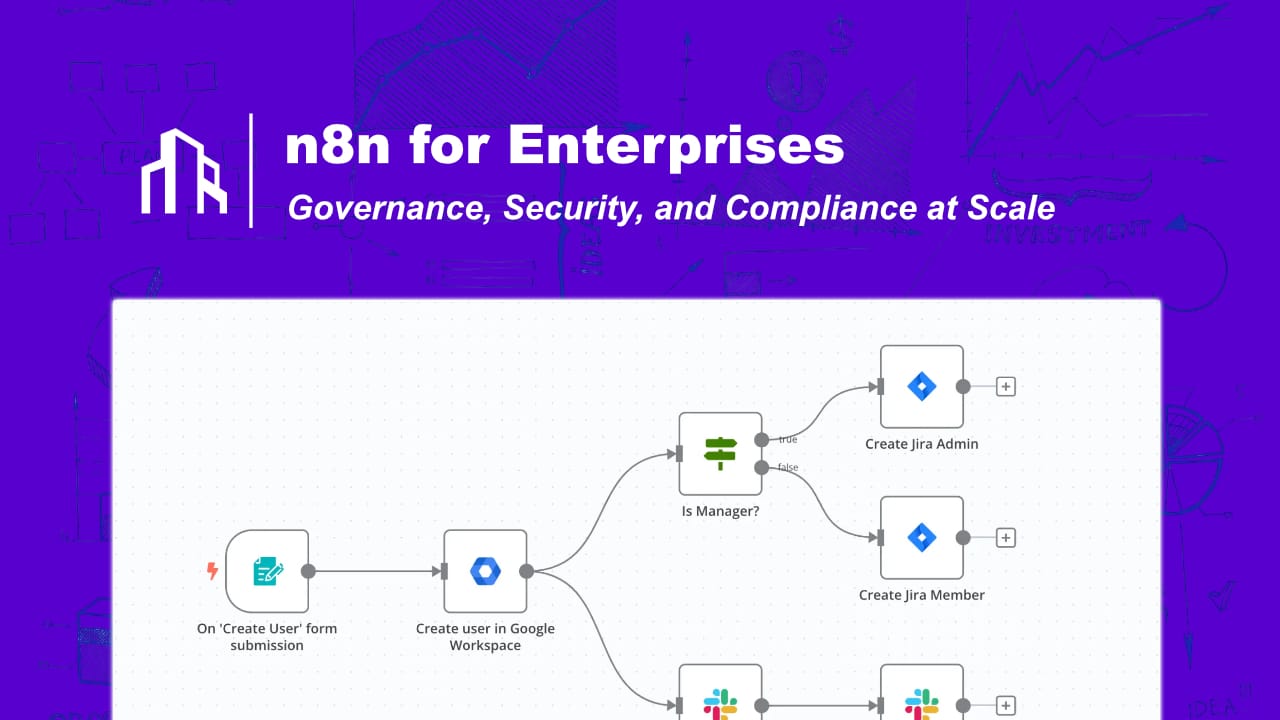n8n for Enterprises: Governance, Security, and Compliance at Scale

Automation platforms often start in startups or small teams, but enterprises face a different challenge. They need more than flexibility. They need governance, security, compliance, and reliability. This is where n8n moves beyond being a developer tool and proves its value for organizations that must run workflows at scale.
This article explores how enterprises can use n8n as a foundation for secure automation, what governance features matter most, and how to align it with compliance frameworks without slowing down innovation.
Why Enterprises Are Adopting n8n
Many companies outgrow simple automation tools like Zapier or Make. At enterprise level, the concerns shift:
- Data residency and control – workflows must run where the company decides, not in a vendor’s cloud.
- Vendor independence – enterprises don’t want to rely on closed APIs or opaque billing.
- Scalability – workflows must handle thousands of events without performance issues.
- Customization – teams need flexibility to extend automations with custom logic, APIs, or integrations.
n8n’s self-hosting model, open-source ecosystem, and enterprise license options give enterprises the control and scalability they need.
Governance Features That Matter
Enterprises must enforce strict standards across teams. n8n provides governance opportunities that smaller tools cannot match:
- Role-based access control (RBAC)
Assign permissions by role, ensuring only authorized users can create, edit, or deploy workflows. - Audit logging
Every action is tracked, helping compliance teams trace workflow changes and prove accountability. - Data residency
Self-hosting means workflows and data never leave your chosen infrastructure, supporting GDPR and industry-specific compliance. - Versioning and workflow history
Track changes to workflows, roll back to stable versions, and enforce review processes before deployment. - Custom authentication
Integrate with SSO providers like Okta or Azure AD to align n8n with existing enterprise identity systems.
Security and Compliance in Practice
Enterprises cannot treat automation as a “shadow IT” project. A governance-first approach ensures automation stays aligned with corporate policy.
- GDPR compliance – sensitive data can remain on-premises or in a controlled private cloud.
- Industry frameworks – healthcare, finance, and legal sectors can map n8n processes to ISO 27001 or SOC 2 requirements.
- Segregated environments – dev, staging, and production instances help maintain quality gates.
By combining governance controls with structured onboarding for teams, enterprises prevent risky workflows while still enabling innovation.
Moving From Pilot to Scale
Enterprises often begin with small proof-of-concepts. Scaling requires structure:
- Central governance team to define policies.
- Standard workflow libraries for repeatable processes (HR onboarding, CRM sync, reporting).
- Monitoring and observability with logging and dashboards to spot bottlenecks.
- Training and enablement so business users understand guardrails.
This approach transforms n8n into a platform, not just a tool.
Scalevise Can Help
At Scalevise, we specialize in helping enterprises unlock automation without losing control. From governance frameworks to compliance-ready workflows, we ensure your n8n setup aligns with both business growth and security requirements.
Contact us today to discuss how we can tailor n8n for your enterprise.
Conclusion
For enterprises, automation without governance is a liability. n8n offers a rare combination: open-source flexibility with enterprise-grade governance and compliance. By adopting a structured approach, large organizations can scale automation responsibly, keeping innovation alive while protecting data, customers, and compliance.
